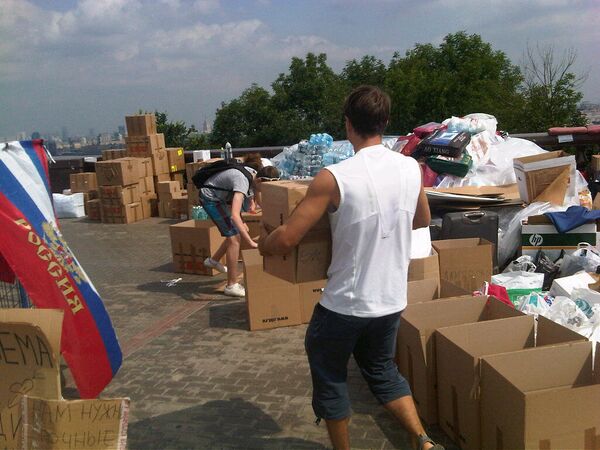Several dozen volunteers worked for a third straight day in downtown Moscow on Tuesday to organize aid for Black Sea towns hit by deadly flooding, in the latest example of the growth of civil activism in Russia.
“The authorities have not acted,” said middle-aged Muscovite schoolteacher Lyudmila Miritina at an open-air collection point at the capital’s landmark Sparrow Hills. “And so I am helping out as much as I can. This is the kind of thing everyone should decide for themselves if they need to do.”
Around her, fellow volunteers, ranging from university students on their summer vacations to pensioners, helped sort and pack boxes of food, water, medicine and bedding for stricken residents of south Russia’s Krasnodar region, where at least 172 people are now known to have died in July 7 flooding.
At one point, a volunteer arrived with a huge, green fluffy dragon, just one of many donated gifts for the hundreds of children made homeless by what regional governor Alexander Tkachov has called the area’s worst flooding in living memory. Over 5,000 homes were also destroyed and some 20,000 people remain without electricity in the region.
Like the massive wildfires that devastated central Russia two years ago, the latest disaster to befall the country has also seen hundreds of people volunteer to tackle a crisis they believe the authorities are unable to handle efficiently.
“The authorities couldn’t even do a very simple thing like send a truck around with loudspeakers to warn people,” said analyst Maria Lipman at the Moscow-based Carnegie Center think-tank. “We have again seen an inefficient, at times bungled government operation.”
This week’s pooling of resources is part of an ongoing trend in Russia that has seen ordinary people join together on issues such as missing persons, environmental protection or the homeless problem, all areas where the authorities have been criticized.
“The rise of civil activism which has evolved over the last two or three years is a very important phenomenon of Russian life that is very much underestimated and often under-noticed,” Lipman said. “We are talking about a modernized constituency - mostly in Moscow, but not only - that has grown independent and is used to making their own decisions.”
Emergencies Minister Vladimir Puchkov said on Sunday that people left homeless by the flooding would receive 100,000 rubles in compensation (about $3,000). The authorities have also pledged to rebuild all the houses that were destroyed in the disaster before the onset of winter.
But as with the fires that shrouded Moscow in a toxic smog for over a week in 2010, the flooding has likewise triggered a widespread criticism of the authorities. Survivors interviewed by RIA Novosti say they were given no warning before the floods struck, something at least partially acknowledged by Puchkov.
President Vladimir Putin flew over the region to view the destruction on Saturday but did not meet with local residents, a fact that analysts have speculated may have been due to a fear he could become a target for their anger.
But at the Sparrow Hills collection site, just one of eight across Moscow, there was little talk of politics. Volunteers instead displayed a steely determination to help those in need, irrespective of whatever assistance the authorities may – or may not – offer.
“I’ve been working here for two days already,” said volunteer Gennady Kramskoi, 52, at the Sparrow Hills collection point as he paused for breath. “Yesterday we used our own money to send off two trucks carrying aid.”
“The emergencies ministry has promised to send a truck down later tonight,” he shrugged. “I don’t know what time that is going to be though, we’ll see.”
Activists had earlier cheered as OMON riot police officers brought aid parcels to the site for volunteers to deliver to the needy.
Other volunteers are already in the Krasnodar region to help with the aid effort, although Communist Party volunteers said on Monday in a Twitter post that police had told them to leave the area or be “detained as looters.”
Opposition politicians have been quick to hit out at the authorities over the disaster and the high death-toll. A criminal investigation has been opened into the flood deaths and Putin has demanded a report on the disaster by the end of the week.

